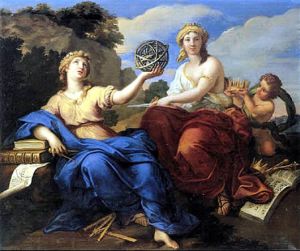Introduction
"Sing in me, Muse, and through me tell the story of that man skilled in all ways of contending, the wanderer, harried for years on end, after he plundered the stronghold on the proud height of Troy."

Muses are goddesses from Greek and Roman mythology who are considered to be a source of knowledge and inspiration. The nine muses are Zeus and Titan's daughters.
-
Calliope: beautiful-voiced and represents epic poetry and also rhetoric,
-
Clio: glorifies and represents history,
-
Erato: lovely and represents singing,
-
Euterpe: delightful and represents lyric poetry,
-
Melpomene: sings and represents tragedy,
-
Polymnia: harmonizes and represents hymns to the gods and heroes,
-
Terpsichore: splendid in dance,
-
Thalia: flourishes and represents comedy,
-
Urania: heavenly and represents astronomy
Today, people refer to a muse as one who inspires a writer or other artist. People often go to the museum to look at collections of great work. The word museum comes from the Greek word Mouseion, a place devoted to the arts that is sacred to the Muses.
Do you have a muse, someone or something that inspires you?
| Lesson Objectives |
|
Following successful completion of this lesson, students will be able to...
The above objectives correspond with the Creative Writing Course Standards: 1. |